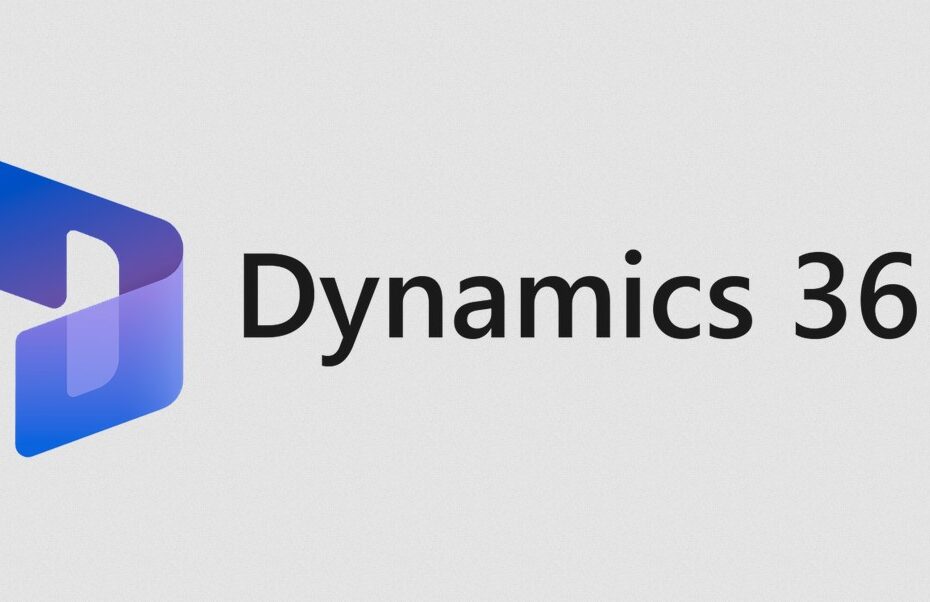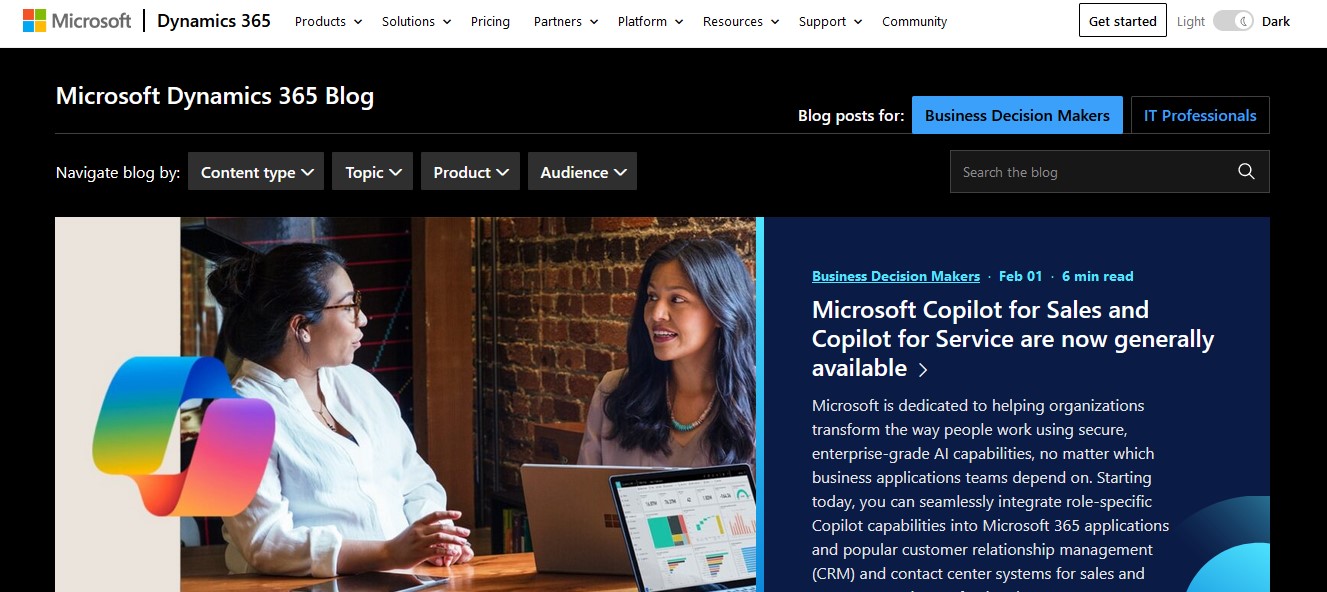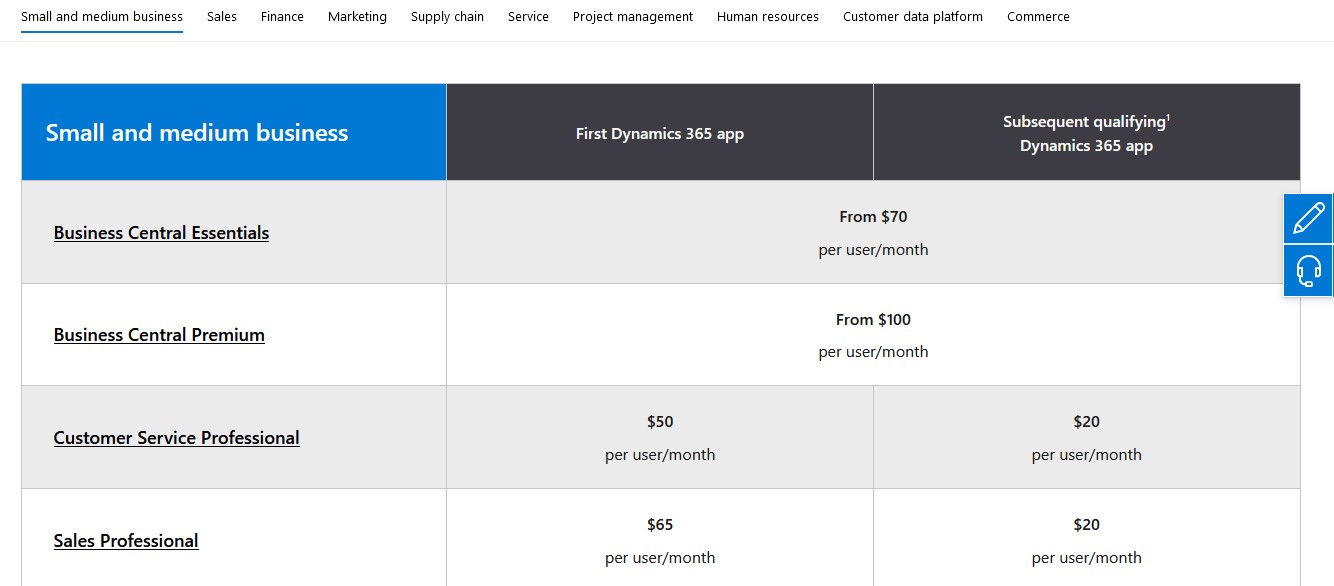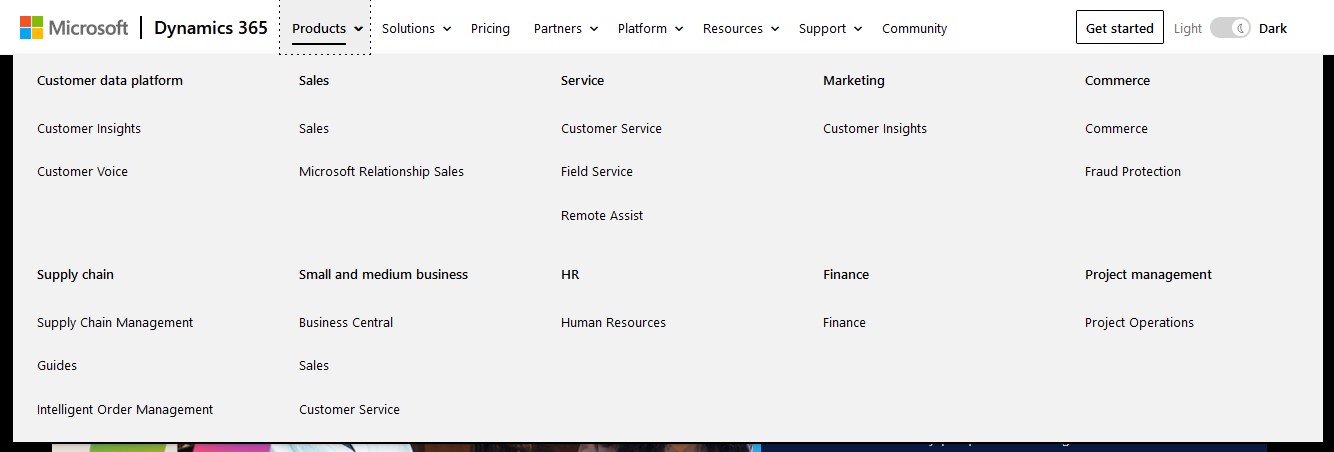When it comes to choosing a CRM system, Dynamics 365 is often at the top of the list for many businesses due to its comprehensive features and flexible pricing options. The pricing model for Dynamics 365 is based on a subscription basis, allowing businesses to choose from different plans based on their needs and budget. This scalability makes it an attractive option for both small businesses and large enterprises looking to implement a CRM solution. In terms of features, Dynamics 365 offers a wide range of tools designed to streamline sales, marketing, and customer service processes.
Reviews of Dynamics 365 are generally positive, with users praising its user-friendly interface, seamless integration with other Microsoft products, and powerful analytics capabilities. Many users find that the customizable nature of Dynamics 365 allows them to tailor the system to fit their specific business requirements. However, some users have noted that the initial setup process can be complex and may require additional training for staff members. For those seeking alternatives to Dynamics 365, popular options include Salesforce CRM, Zoho CRM, and HubSpot CRM – each offering unique features and pricing structures that may better suit certain businesses’ needs.
In conclusion, Dynamics 365 stands out as a leading CRM solution due to its competitive pricing, robust features, positive reviews from users. While there are alternative options available in the market offering similar functionalities, Dynamics 365’s seamless integration with other Microsoft products sets it apart from competitors.
Dynamics 365 is a comprehensive suite of business applications by Microsoft that offers a wide range of features and pricing options to cater to different business needs. The pricing for Dynamics 365 is flexible, with various plans available depending on the specific modules and functionalities required by the organization. From sales and marketing to customer service and operations, Dynamics 365 provides a seamless integration of tools to streamline business processes.
In terms of features, Dynamics 365 offers robust CRM and ERP capabilities, allowing organizations to manage their customer relationships, financials, supply chain, and more in one unified platform. The system also integrates well with other Microsoft products such as Office 365 and Power BI, enabling users to leverage data insights for better decision-making. Reviews for Dynamics 365 are generally positive, with users praising its user-friendly interface, customization options, and scalability. Alternatives to Dynamics 365 include Salesforce CRM, SAP Business One, and Oracle NetSuite, each offering unique strengths and functionalities for different business requirements.
Overview of Dynamics 365 software
Dynamics 365 is a comprehensive suite of business applications by Microsoft that helps organizations manage their sales, customer service, marketing, finance, operations, and more. It integrates with other Microsoft products like Office 365 and provides a unified platform for businesses to streamline their processes and improve efficiency. With features such as AI-driven insights, automation tools, and customizable dashboards, Dynamics 365 enables companies to make data-driven decisions and deliver exceptional customer experiences.
One key advantage of Dynamics 365 is its scalability – it can be tailored to meet the specific needs of businesses of all sizes and industries. The cloud-based nature of the software allows for easy accessibility from anywhere, promoting collaboration among teams and enabling remote work capabilities. Overall, Dynamics 365 offers a powerful solution for organizations looking to optimize their operations, drive growth, and stay competitive in today’s dynamic business environment.
Dynamics 365 is a powerful software suite developed by Microsoft that provides a range of cloud-based applications for businesses. One of the key components of Dynamics 365 is its Customer Relationship Management (CRM) system, which allows companies to manage and analyze customer interactions and data in order to improve relationships and drive sales. With CRM capabilities integrated into the platform, businesses can easily track customer behavior, preferences, and purchase history to tailor their marketing efforts and provide personalized services.
Furthermore, Dynamics 365 offers seamless integration with other Microsoft tools such as Office 365, Power BI, and Azure for enhanced productivity and efficiency. This ensures that users have access to a comprehensive set of tools for managing various aspects of their business operations within a single platform. The user-friendly interface of Dynamics 365 makes it easy for employees at all levels to navigate the software and leverage its features effectively. Overall, Dynamics 365 has become an essential tool for businesses looking to streamline their processes, improve customer satisfaction, and drive growth through data-driven insights provided by its CRM functionality.
Dynamics 365 CRM Pricing: Subscription plans and costs breakdown
Pricing Dynamics 365 CRM subscription plans can be a complex process, as it involves understanding the various features and services offered by Microsoft. The pricing structure typically includes different tiers or editions of the CRM software, each with its own set of functionalities and capabilities. Customers have the option to choose from packages that cater to their specific needs and budget constraints. For example, smaller businesses may opt for a basic plan with limited features, while larger enterprises may require more advanced functionality and customization options.
The costs breakdown for Dynamics 365 CRM subscription plans usually includes a monthly or annual fee per user license. Additional costs may also apply for add-on services such as extra storage space or premium support. It is essential for organizations to carefully evaluate their requirements and compare pricing options in order to select the most cost-effective solution that aligns with their business goals. Factors such as scalability, integration capabilities, and ongoing maintenance expenses should also be taken into consideration when determining the total cost of ownership for implementing Dynamics 365 CRM within an organization’s operations. By conducting thorough research and consulting with Microsoft experts, businesses can make informed decisions about choosing the right subscription plan that meets their needs while staying within budget constraints.
In conclusion, understanding Dynamics 365 CRM pricing dynamics involves analyzing the various subscription plans available and breaking down associated costs to determine overall affordability. By leveraging Microsoft’s flexible pricing model and customizable options, organizations can tailor their CRM solution to fit unique business requirements without overspending on unnecessary features.
Dynamics 365 CRM offers a variety of subscription plans to cater to different business needs and sizes. The pricing for Dynamics 365 CRM is typically based on a per user, per month basis, with different tiers available depending on the features and functionalities required. The plans range from basic sales and customer service tools to more advanced marketing automation and field service capabilities.
The costs breakdown for Dynamics 365 CRM can vary depending on the specific plan chosen, the number of users, and any additional add-ons or customizations required. It is important to carefully evaluate your organization’s requirements and budget in order to choose the most suitable subscription plan. Additionally, Microsoft often runs promotions or discounts for new customers, so it may be worth exploring these options before making a final decision on pricing.
Dynamics 365 CRM Features: Key functionalities and benefits overview
Dynamics 365 CRM offers a wide range of key functionalities and benefits that can greatly enhance customer relationship management processes. One of the key features is its robust data management capabilities, allowing users to easily store and access customer information in one centralized location. This helps improve efficiency and accuracy in managing customer interactions.
Additionally, Dynamics 365 CRM provides powerful analytics tools that enable businesses to gain valuable insights into customer behavior and preferences. By analyzing this data, organizations can make informed decisions to personalize marketing strategies, improve customer satisfaction, and drive business growth. Overall, Dynamics 365 CRM offers a comprehensive solution for managing customer relationships effectively and efficiently.
Dynamics 365 CRM is a powerful tool that offers a wide range of key functionalities to help businesses streamline their customer relationship management processes. One of the standout features of Dynamics 365 CRM is its ability to centralize customer data, making it easier for businesses to track interactions and provide personalized experiences. With this platform, companies can create detailed customer profiles, track communication history, and analyze data trends to better understand their customers’ needs and preferences.
Furthermore, Dynamics 365 CRM offers robust automation capabilities that help save time and increase efficiency in various tasks such as lead management, email marketing campaigns, and sales pipeline tracking. By automating repetitive tasks and workflows, businesses can focus more on building meaningful relationships with customers rather than getting bogged down by administrative work. Additionally, the platform provides real-time insights through customizable dashboards and reports, allowing businesses to make informed decisions based on accurate data analysis. Overall, Dynamics 365 CRM’s key functionalities offer significant benefits in helping organizations improve customer satisfaction levels and drive business growth through enhanced efficiency and productivity.
Dynamics 365 CRM Reviews: Customer feedback and satisfaction ratings
As a business owner, the success of my company relies heavily on maintaining positive customer relationships and providing exceptional service. Implementing Dynamics 365 CRM has been a game-changer in terms of managing customer interactions and streamlining our sales processes. The feedback and satisfaction ratings we have received from our clients regarding Dynamics 365 CRM have been overwhelmingly positive, confirming its value in enhancing their experience with our brand.
Customers appreciate the seamless integration of data across different departments, allowing for more personalized interactions and efficient problem-solving. This level of organization has not only increased overall customer satisfaction but also improved employee productivity as they have easy access to all relevant information in one centralized platform. Furthermore, the customizable features of Dynamics 365 CRM have enabled us to tailor our services to meet specific client needs, leading to higher levels of engagement and loyalty among our customers.
In conclusion, the reviews and customer feedback regarding Dynamics 365 CRM speak volumes about its effectiveness in fostering strong relationships with clients and driving business growth. The high satisfaction ratings are a testament to the system’s ability to streamline operations, increase efficiency, and ultimately deliver a superior customer experience. Moving forward, we will continue to leverage this powerful tool to further enhance our service offerings and solidify our reputation as a trusted provider in the industry.
Dynamics 365 CRM has received generally positive reviews from customers, with many highlighting its user-friendly interface and robust features for managing customer relationships. Customers have praised the platform for its customization options, which allow businesses to tailor their CRM system to meet their specific needs. Additionally, users have reported high levels of satisfaction with Dynamics 365 CRM’s integration capabilities with other Microsoft products, such as Office 365 and Power BI.
Overall, customer feedback indicates that Dynamics 365 CRM is a reliable and efficient tool for businesses looking to streamline their sales and marketing processes. Users appreciate the platform’s ability to centralize customer data, track interactions, and generate insightful reports for informed decision-making. While there may be some room for improvement in terms of pricing and support services, the majority of reviews suggest that Dynamics 365 CRM is a valuable investment for organizations seeking to enhance their customer relationship management strategies.
Dynamics 365 CRM Alternatives: Competing software options to consider
When considering alternatives to Dynamics 365 CRM, there are several competing software options worth exploring. Salesforce is a popular choice for its robust features and customization options, making it a strong competitor in the CRM market. Zoho CRM is another alternative that offers a user-friendly interface and affordable pricing plans, making it suitable for small to medium-sized businesses.
Another option to consider is HubSpot CRM, which provides powerful tools for managing contacts, deals, and marketing campaigns. HubSpot’s seamless integration with other marketing automation tools makes it a compelling choice for businesses looking to streamline their sales and marketing processes. Ultimately, the best alternative will depend on your specific business needs and budget constraints, so it’s important to thoroughly research and compare different options before making a decision.
When it comes to choosing a CRM software, Dynamics 365 is often a popular choice due to its integration with other Microsoft products and robust features. However, there are several competing software options that businesses should consider before making a decision. One alternative is Salesforce, known for its flexibility and customization options. Salesforce offers a wide range of tools for sales, marketing, and customer service, making it a versatile choice for businesses of all sizes.
Another CRM alternative worth exploring is HubSpot CRM, particularly appealing for small to medium-sized businesses looking for user-friendly interface and affordable pricing. HubSpot CRM provides powerful tools for managing contacts, tracking deals, and analyzing data to improve customer relationships. Additionally, Zoho CRM is another strong contender in the market with its comprehensive suite of applications including sales automation, marketing automation, and customer support functionalities. Zoho’s competitive pricing and easy scalability make it an attractive option for growing businesses looking to streamline their operations.
In conclusion, while Dynamics 365 remains a top player in the CRM software market, there are several compelling alternatives that offer unique features and benefits suited to different business needs. By considering options like Salesforce, HubSpot CRM, or Zoho CRM alongside Dynamics 365, businesses can make an informed decision based on their specific requirements and goals. Each of these alternatives brings something different to the table in terms of functionality, usability, and affordability – empowering businesses to choose the best fit for their organization’s success.
Dynamics 365 CRM Integration: Compatibility with other tools and systems
Integration is a key component of any successful CRM system, and Dynamics 365 CRM shines in its compatibility with other tools and systems. The seamless integration capabilities of Dynamics 365 allow businesses to connect their CRM system with various applications, such as marketing automation platforms, ERP systems, and business intelligence tools. This level of compatibility enables organizations to streamline their operations, enhance data visibility, and improve overall efficiency.
One of the standout features of Dynamics 365 CRM integration is its ability to work cohesively with Microsoft’s suite of productivity tools such as Outlook, SharePoint, and Power BI. By leveraging these integrated solutions, users can access customer data directly from familiar interfaces and collaborate more effectively across different departments. Furthermore, Dynamics 365’s open architecture makes it easy to integrate with third-party software solutions through APIs and connectors. This flexibility empowers businesses to customize their CRM system based on their unique needs and easily adapt to changing technology landscapes.
In conclusion, the compatibility of Dynamics 365 CRM with other tools and systems plays a crucial role in maximizing the benefits of a comprehensive customer relationship management strategy. With its robust integration capabilities, businesses can create a unified ecosystem that connects disparate systems and processes for a more cohesive customer experience. By leveraging the power of Dynamics 365’s integrations, organizations can unlock new opportunities for growth, innovation, and competitive advantage in today’s fast-paced digital economy.
Conclusion
In conclusion, choosing the right CRM solution for your business is a crucial decision that requires careful consideration of various factors. Dynamics 365 offers a comprehensive suite of features that can streamline your sales, marketing, and customer service processes. Its flexible pricing options make it accessible to businesses of all sizes, while its integration with other Microsoft products provides a seamless user experience.
When exploring alternatives to Dynamics 365, be sure to evaluate how each platform aligns with your specific business needs and objectives. While Dynamics 365 excels in its Microsoft ecosystem integration and robust functionality, other CRM solutions may offer unique features or pricing structures that better suit your requirements. Ultimately, the key is to choose a CRM system that not only meets your current needs but also has the scalability to support your future growth and success in an ever-evolving market landscape.




